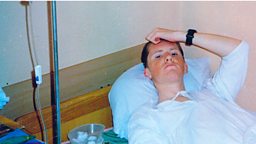Appendix removal: I woke up in the middle of surgery
Eli McCann was a young Mormon missionary working in a small city in western Ukraine when he was diagnosed with appendicitis. Emily Finch writes how the need for an emergency operation to remove his appendix saw Eli waking up in the middle of his surgery in a remote Ukrainian hospital.
You can listen to Eli's story in Made of Stronger Stuff, and join psychologist Kimberley Wilson and doctor Xand van Tulleken's exploration of the not-so-useless appendix.
Made of Stronger Stuff

Psychologist Kimberley Wilson and Dr Xand van Tulleken take a journey around the human body. Today, they discover the truth about an organ long dismissed as useless: the appendix. Listen now.
The Pain
Around 8% of us will suffer from acute appendicitis at one point in our lives. The disease usually doesn’t lead to long term damage if it’s swiftly diagnosed and treated. But if it’s left too long and the inflamed appendix bursts, causing a wave of bacteria to flood the abdomen, it can lead to organ damage or even death in rare cases.
“I just thought, well, this will probably go away. I was young and dumb.”
The need for a speedy operation to remove his appendix saw Eli McCann, now 36, waking up in the middle of surgery in a remote Ukrainian hospital, thousands of miles from his friends and family.
Eli, who now works as a litigation lawyer, led a very different life in his 20s, as a Mormon missionary. He hails from Salt Lake City, Utah, the home of the Church of Jesus Christ of Latter Day Saints and he was sent to live near Lviv, a city on the western fringes of Ukraine. He had been a missionary there for two years, knocking on doors while wearing a crisp white shirt and a sharp tie and he had even picked up some basic Ukrainian.
But one hot summer’s day in 2004, Eli noticed a pain in the lower right side of his stomach. He remembers initially dismissing the ache: “I just thought, well, this will probably go away. I was young and dumb.” The pain worsened and he had to be helped back to his apartment by a fellow missionary, unable to make the short journey on his own.

The Forest Hospital
Eli panicked and started calling friends, asking them what he should do. He was told of a “pretty decent” hospital in the middle of a forest around a 30-minute drive from the city. He ordered a taxi but the journey was agonising, with thoughts of what could be wrong with his body rushing through his mind as he lay in the back of the car.
When he arrived at the hospital, he was greeted by a large Soviet-era building and a doctor quickly led him inside. After some prodding, Eli was diagnosed with appendicitis – a painful swelling of the appendix. He was told that he would need surgery, fast. Eli was left to wait in a hospital bed until 1am when a nurse told him it was time for his operation: “I was terrified. I'm by myself. I don't have my family there either.”
The Operation
He remembers yelling at the doctors and asking them not to guess his weight as his world went dark. The operation had begun.
A nurse held Eli’s shaking hand and calmly led him through the darkened hospital. As he walked, he saw a flickering light coming from a room at the end of the gloomy corridor. This was the operating room. “I will never forget these images as long as I live,” said Eli.
An anaesthetist asked Eli in Ukrainian how much he weighed so she could decide the amount of general anaesthetic to use. But Eli didn’t know his weight in kilograms, only in pounds: “We were having a major miscommunication.” He remembers yelling at the doctors and asking them not to guess his weight as his world went dark. The operation had begun.
When Eli next woke, he noticed a light bulb hanging over his body. He felt groggy but relieved: “I was so excited because I had survived the surgery.” But as he looked down his body, hoping to see neat bandages, he was horrified to see an open incision with doctors still working on him. The doctors carried on, unaware that Eli could see what they were doing. He started flailing and screaming: “This nurse ran up to the top of the table and she grabbed my forehead and just slammed it down onto the table because they didn't want me to see it. It was pandemonium and everybody was screaming and yelling.” Eli was quickly given more general anaesthetic and his world went dark once more.
Luckily, Eli didn’t suffer any further complications. His appendix was removed without any lasting physical damage and the pain quickly eased. But for a few years afterwards, he’d have recurring nightmares featuring flashbacks of waking up during the operation: “I would wake up in a panic, you know, and have to calm myself back down. And so there was definitely some lingering distress over that.”
But these days, Eli is more than happy to share his story about waking up in the middle of surgery, thousands of miles away from his friends and family. He still has a three-inch scar on his abdomen: “I like that I have it. It's like a little souvenir from one of the most memorable experiences of my life.”
You can hear Eli's story in Episode 5 of Made of Stronger Stuff, available on ���˿��� Sounds.
We think you'll also like...
-
![]()
The Gut Instinct: A Social History
In this five-part series, Tim Hayward explores the complex human relationship with its gut – from how we talk about it to how we have reacted to its ills, and from obsession to veneration via constipation.
-
![]()
The Essay - Ned Beauman: the Appendix
Five writers choose an organ of the body on which to reflect. In his piece, novelist and journalist Ned Beauman confronts the idea that the appendix is redundant.
-
![]()
The Curious Cases of Rutherford and Fry: The growling stomach
"Why do our tummies rumble - and when they do, does it always mean we are hungry?"
-
![]()
The Patch: Angsley
The postcode generator takes us to North Wales where we discover a Latter-day Saints chapel, the timely beliefs of their members, and the work of two missionaries in lockdown.




